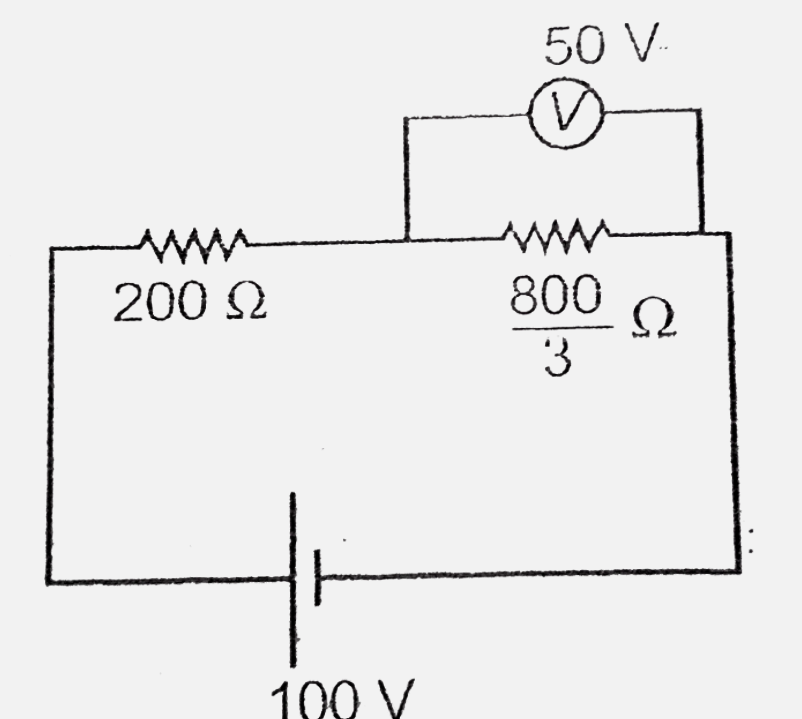Assertion : If by mistake, a voltmeter is connected in series, then circuit will burn.
Reason : Current will drastically decrease in the circuit.
If both Assertion and Reason are true and Reason is the correct explanation of Assertion.
If both Assertion and Reason are true and Reason is not correct explanation of Assertion.
If Assertion is true but Reason is false.
If Assertion is false but Reason is true.
The correct Answer is:D
To solve the assertion and reason question, we need to analyze both the assertion and the reason provided.
Step 1: Understand the Assertion
The assertion states: "If by mistake, a voltmeter is connected in series, then the circuit will burn."
- Analysis: A voltmeter is designed to measure the potential difference across two points in a circuit and is meant to be connected in parallel. If a voltmeter is mistakenly connected in series, it will introduce a high resistance into the circuit.
Step 2: Understand the Reason
The reason states: "Current will drastically decrease in the circuit."
- Analysis: When a voltmeter is connected in series, the total resistance of the circuit increases significantly because voltmeters have high internal resistance. According to Ohm's Law (V = IR), if the resistance increases, the current (I) must decrease for a given voltage (V). Thus, the current will indeed decrease drastically.
Step 3: Conclusion on Assertion and Reason
- The assertion claims that the circuit will burn, which is incorrect. The increased resistance from the voltmeter will lead to a decrease in current, which means that there will be less heating in the circuit, not more. Therefore, the circuit will not burn.
- The reason is correct; connecting a voltmeter in series will lead to a drastic decrease in current.
Final Answer
- The assertion is false.
- The reason is true.
Thus, the correct conclusion is that the assertion is false while the reason is true.
---
The assertion states: "If by mistake, a voltmeter is connected in series, then the circuit will burn."
The reason states: "Current will drastically decrease in the circuit."
- The assertion claims that the circuit will burn, which is incorrect. The increased resistance from the voltmeter will lead to a decrease in current, which means that there will be less heating in the circuit, not more. Therefore, the circuit will not burn.
- The reason is correct; connecting a voltmeter in series will lead to a drastic decrease in current.
- The assertion is false.
- The reason is true.
Topper's Solved these Questions
- CURRENT ELECTRICITYBOOK - DC PANDEY ENGLISHCHAPTER - CURRENT ELECTRICITYEXERCISE - Match the columns
4 Videos
- CURRENT ELECTRICITYBOOK - DC PANDEY ENGLISHCHAPTER - CURRENT ELECTRICITYEXERCISE - Medical entrances gallery
97 Videos
- CURRENT ELECTRICITYBOOK - DC PANDEY ENGLISHCHAPTER - CURRENT ELECTRICITYEXERCISE - Taking it together
142 Videos
- COMMUNICATION SYSTEMBOOK - DC PANDEY ENGLISHCHAPTER - COMMUNICATION SYSTEMEXERCISE - Subjective
11 Videos
- ELECTROMAGNETIC INDUCTIONBOOK - DC PANDEY ENGLISHCHAPTER - ELECTROMAGNETIC INDUCTIONEXERCISE - Medical entrances gallery
25 Videos
Similar Questions
An ammeter is always connected is series in a circuit because........
View SolutionWhat is the resistance of voltmeter shown in the circuit ?

View SolutionAssertion : Voltmeter is connected in parallel with the circuit
Reason : Resistance of a voltmeter is very large.
View SolutionPower factor in series LCR circuit at reasonance is
View SolutionAssertion: A voltmeter must b e connected in parallel in a circuit and it should have a high resistance.
Reason: The voltmeter in the circuit must not affect the P.D. it is to measure.
View Solution(A) : An ammeter is connected in series in the circuit.
(R) : An ammeter is a high resistance galvanometer.
View SolutionBy mistake, a voltmeter is connected in series and an ammeter is connected in parallel, with a resistance in an electrical circuit. What will happen to the instruments?
View SolutionWhy is ammeter connected in series and voltmeter in parallel in the circuit?
View SolutionWhat result do you expect in above experiment, if by mistake, voltmeter is connected in series with the resistance.
View SolutionVoltmeter reading in the given circuit is (voltmeter is ideal

View Solution
